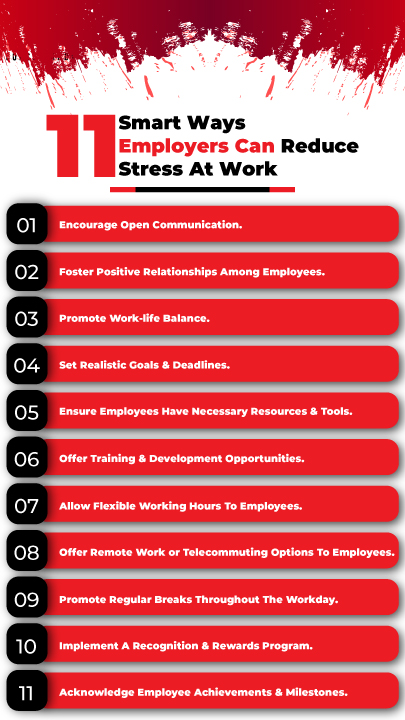
11 Smart Ways Employers Can Reduce Stress At Work
In today's fast-paced and demanding work environments, stress has become an all-too-familiar companion for many employees.
As an employer, fostering a stress-free workplace is not just a refinement but a strategic investment in the well-being and productivity of your workforce.
Addressing workplace stress is both a compassionate approach and a strategic one.
Research consistently shows that high-stress levels can lead to decreased employee engagement, higher absenteeism rates, and reduced productivity.
On the other hand, a stress-free work environment promotes higher job satisfaction, enhanced mental health, and increased employee retention.
Reducing stress at work benefits employees' overall health and happiness and leads to increased productivity, improved employee retention, and positive company culture.
By implementing smart and effective strategies to reduce stress, you can create a positive work culture where employees thrive and succeed.
Read More: Tips To Decide How Much To Pay Employees In Canada.
Workplace stress is a significant concern affecting employees across industries.
As an employer, it is crucial to prioritize the well-being of your workforce and create a positive work environment that fosters productivity, engagement, and overall job satisfaction.
From establishing a supportive work culture to implementing flexible work options, providing resources and support, and promoting employee wellness programs, there are numerous strategies employers can employ to address workplace stress effectively.
By taking proactive measures, employers can help alleviate stressors, enhance work-life balance, and promote mental well-being among their employees.
In this blog post, we will explore 11 smart ways employers can reduce stress at work and cultivate a happier and healthier workplace.
11 Smart Ways Employers Can Reduce Stress At Work:
Here are the 11 smart ways employers can reduce workplace stress and create a friendly environment.

1. Encourage Open Communication:
One of the key pillars of a supportive work culture is fostering open communication.
Encourage employees to express their thoughts, concerns, and ideas without fear of judgment or reprisal.
Establish channels for regular feedback and provide opportunities for one-on-one discussions or team meetings.
Actively listen to your employees' feedback and consider their suggestions.
When employees feel heard and valued, it cultivates a sense of trust and transparency, reducing stress and promoting a collaborative work environment.
2. Foster Positive Relationships Among Employees:
Building positive relationships among employees is crucial for creating a supportive work culture.
Encourage teamwork, collaboration, and mutual respect. Organize team-building activities, social events, or workshops that promote fellowship and encourage employees to get to know one another on a personal level.
Strong interpersonal connections foster a sense of belonging, support, and understanding, reducing workplace stress and creating a harmonious work environment.
3. Promote Work-life Balance:
A healthy work-life balance is essential for reducing stress and promoting overall well-being.
As an employer, you should encourage employees to prioritize self-care, personal interests, and time spent with family and friends outside of work.
To accommodate individual needs and responsibilities, provide flexible work arrangements, such as flexible working hours or remote work options.
Avoid overloading employees with excessive work demands and unrealistic deadlines, leading to burnout.
Promoting work-life balance empowers employees to manage their personal and professional lives effectively, reducing stress and increasing job satisfaction.
Also, creating a supportive work culture that prioritizes open communication, positive relationships, and work-life balance lays the foundation for a stress-free environment.
By fostering a sense of trust, collaboration, and well-being, employers can empower their employees to thrive and contribute their best efforts while mitigating workplace stressors.
4. Set Realistic Goals & Deadlines:
Clear expectations regarding goals and deadlines are essential for reducing workplace stress.
Employers should ensure that goals and objectives are communicated clearly and realistically.
Collaborate with employees to set achievable targets and establish a reasonable timeline for completion.
Avoid overwhelming employees with excessive workloads or unrealistic expectations, which can increase stress levels.
When employees clearly understand what is expected of them and feel confident in meeting those expectations, it fosters a sense of control and reduces anxiety.
5. Ensure Employees Have Necessary Resources & Tools:
To support employees in their roles and reduce stress, providing them with the necessary resources and tools to succeed is crucial.
Assess and address any resource gaps hindering their productivity or creating unnecessary stress.
This could involve providing updated technology, software, equipment, or adequate workspace arrangements.
Regularly check in with employees to identify any resource-related challenges and take prompt action to address them.
Employees with access to the right resources can perform their tasks efficiently, minimizing stress and frustration.
6. Offer Training & Development Opportunities:
Investing in employees' professional growth through training and development opportunities is a powerful way to reduce stress and enhance job satisfaction.
Provide access to workshops, seminars, online courses, or mentorship programs that align with employees' career aspirations and skill development needs.
You demonstrate a commitment to their success and well-being by offering growth opportunities.
Continuous learning and skill enhancement increase employees' confidence, job satisfaction, and stress reduction, as they feel better equipped to handle their responsibilities and navigate challenges.
7. Allow Flexible Working Hours To Employees:
Implementing flexible working hours can significantly reduce stress among employees.
Recognize that individuals have different peak productivity times and personal obligations outside work.
Employees can adjust their schedules to accommodate their individual needs and optimize their productivity by allowing flexible working hours.
This flexibility promotes a healthier work-life balance, reduces commuting stress, and empowers employees to manage their personal and professional responsibilities better.
8. Offer Remote Work or Telecommuting Options To Employees:
Remote work or telecommuting has become increasingly popular and beneficial for both employees and employers.
Providing the option for employees to work remotely, partially or entirely, can alleviate the stress associated with commuting, office distractions, and balancing work and personal obligations.
Remote work allows individuals to create their ideal work environment, resulting in increased focus, reduced stress, and enhanced work-life integration.
Employers can leverage technology and collaboration tools to ensure effective communication and productivity while embracing a flexible, remote work culture.
9. Promote Regular Breaks Throughout The Workday:
To ensure that workers are healthy and productive, it is essential to encourage them to take breaks frequently during the day.
Breaks provide an opportunity for relaxation, rejuvenation, and mental recharge.
Encourage employees to leave workstations, engage in physical activity, or take short mental breaks.
Promote a culture that recognizes the importance of breaks and discourages excessive overtime or working through lunch.
Employers can also create an environment that values work-life balance and supports stress reduction by prioritizing breaks.
10. Implement A Recognition & Rewards Program:
Implementing a recognition and rewards program is a powerful way to show appreciation for employees' hard work and achievements.
Establish a structured program acknowledging exceptional performance, milestones, and organizational contributions.
This can include an employee of the month awards, spot bonuses, or other incentives tied to performance goals.
Recognizing and rewarding employees creates a positive work environment that boosts morale, motivation, and overall job satisfaction.
11. Acknowledge Employee Achievements & Milestones:
Regularly acknowledge and celebrate employee achievements and milestones within the organization.
This can be done through public recognition, such as team meetings, company-wide announcements, or newsletters.
Take the time to personally congratulate employees on their accomplishments, whether completing a challenging project, reaching a sales target, or receiving positive client feedback.
Acknowledging these milestones makes employees feel valued and appreciated and encourages a sense of pride and fulfillment in their work.
Final Verdict:
Reducing stress at work is not only beneficial for employees but also for the success and growth of the organization as a whole.
Employers must take proactive steps to create a healthier workplace.
Recognize that addressing workplace stress is an ongoing effort and that small changes can make a significant impact.
By investing in the well-being of employees, employers create a positive work environment where individuals can thrive and contribute their best.
By implementing the smart strategies discussed in this blog post, employers can cultivate a supportive work culture, prioritize well-being, and reduce employee stress.
Let's take proactive steps towards creating healthier workplaces and supporting our employees' overall success and happiness.
Related Articles
- June 19, 2024
Recents Posts
- November 15, 2024
- July 16, 2024
